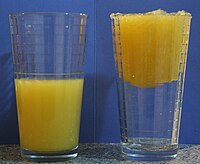This is an essay. It contains the advice or opinions of one or more Wikipedia contributors. This page is not an encyclopedia article, nor is it one of Wikipedia's policies or guidelines, as it has not been thoroughly vetted by the community. Some essays represent widespread norms; others only represent minority viewpoints. |

In Wikipedia, there are a number of paradoxes. This is intended to be a high-level overview of the major conceptual paradoxes within our project.
Paradox 1: Immutable change Authoritative writing strives for perpetual immutability, or "perfection." Wikis facilitate dynamic change that negates immutability and quite often promotes a deviation from authoritative writing.
In the printed encyclopedia model, everything is written from the perspective of authoritative authorship, producing a finished immutable product, one with consistent referentiability and even historical permanence. In the open editing ("wiki") model, any article is constantly changing, and defies immutability and authorship.
We want our articles to have a certain immutability, after they have been perfected, but the open editing ("wiki") model, in addition to facilitating incremental improvements in additive content, also facilitates incremental degradation to the writing and content.
Paradox 2: Conceptualization paradox Expert-written articles are often inaccessible, and non-expert written articles often lack substantive detail.
Experts are invaluable for providing details and even very conceptual overviews. But their writing is often rooted in concepts rooted in expertise itself — expertise that often obfuscates inexpert dimensions — and as such they may assume prerequisite knowledge, or else miss some basic explanatory or relevant concepts.
Students and new learners on the other hand, may often have insights into how to explain concepts in ways that can better shape understanding, even while their expressions may illustrate certain inaccuracies in their understanding. Experts and non-experts who treat each other with hostility thus present a paradoxical aspect of Wikipedia's cooperative and collaborative concept. The principle here is simply that articles must be written by both experts and non-experts for both non-experts and experts.
Paradox 3: Journalism not Journalism An encyclopedia is not a news source, and therefore has none of the news source's material aspects. Still the underlying principles which promote Wikipedia's continued standing are deeply rooted in many of the same concepts of journalistic ethics that news sources must abide by —particularly so when dealing with current events stories that are, for many, first sources of news.
